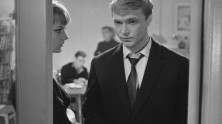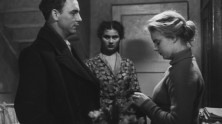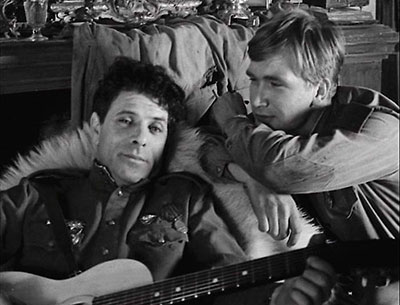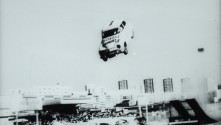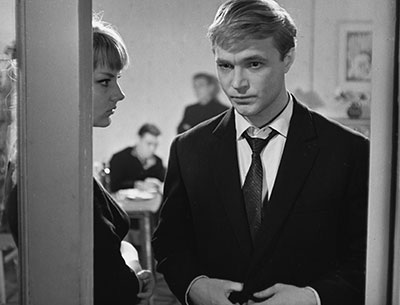
Marlen Khutsiev, Unsung Master of the Modern Cinema
Recent nonagenarian Marlen Martynovich Khutsiev remains one of Soviet cinema's most acclaimed, beloved and unique directors. Once well known both in his native land and abroad, he, like many other Soviet filmmakers, found himself woefully ill equipped for the unfamiliar capitalist environment post-USSR. The resulting confusion may be responsible for the erratic trajectory his later career followed: Khutsiev's latest, Infinitas, was released in 1991, whereas its follow-up Not Yet Evening, the story of Anton Chekhov meeting Leo Tolstoy, has been in development for over ten years now. In the meantime, a new generation of cinephiles may now discover this master of cinema.
Born in 1925 in Tbilisi, then Tiflis, Marlen Khutsiev spent his childhood staging amateur shows with local children in the cast (one show was even based on his self-penned play, Battleship Potemkin). After WWII, he moved to Moscow to begin his studies at the Gerasimov Institute of Cinematography (VGIK), in a workshop run by famous Soviet filmmaker Igor Savchenko. It was under his mentor's tutelage that Khutsiev co-directed, with fellow student Feliks Mironer, his final project––the short subject City Planners (1950). Young Marlen's other teacher was Boris Barnet, whom he assisted on Lyana (1955). In 1956, Khutsiev debuted his Spring on Zarechnaya Street (once again, co-directed with Mironer), which drew over 30 million cinema-starved viewers in the USSR. In 1958, in Odessa, he completed his first solo outing, The Two Fedors, starring the incredible actor and soon-to-be director Vasily Shukshin in his first major role.
The Two Fedors was followed by Ilyich's Gate and July Rain, both emblematic of the Khrushchev Thaw and representative of a kind of Soviet New Wave. Though in synchrony with the latest cinematic movements, these two masterpieces, unfortunately, were met with ostracism. Ilyich's Gate even incurred Khrushchev’s personal wrath and therefore came out in a censored version under the title I Am Twenty, tying for the Jury Prize at the 1965 Venice Film Festival with Bunuel's Simón of the Desert. The original director’s cut did not premiere until 1988.
The Khrushchev Thaw soon gave way to the Brezhnev Stagnation. Russian film critic Miron Chernenko calls July Rain "a requiem for the era," in which the characters from Ilyich's Gate had grown, not just three years, but "a historical cataclysm older." In 1970, Khutsiev made for TV It Was the Month of May, his only film that deals with the Second World War, dubbed in Russia “The Great Patriotic War,” explicitly showing the very first days after the ceasefire. Khutsiev himself tried to enlist, but was turned down due to poor health. He then started touring military hospitals with his theatrical plays. As he himself put it, by being deemed unfit for service, he "took on a lifelong debt." As a result, echoes of WWII reverberate throughout his oeuvre: the veterans’ reunion in July Rain, the postwar everyday life in The Two Fedors, the father’s photo in Ilyich's Gate. The filmmaker's thirteen-year hiatus that followed It Was the Month of May was briefly interrupted in 1974 when Khutsiev finished Mikhail Romm’s testament And Still I Believe and started teaching at VGIK, where he has since mentored filmmakers Abderrahmane Sissako, Vasili Pichul and Bakur Bakuradze.
Though composed of utterly disparate elements, Khutsiev's body of work is startlingly coherent. He is a filmmaker who always had a knack for reinventing himself and his style: from the realist (perhaps neo-, as the Soviets would have it) Spring on Zarechnaya Street and The Two Fedors to the modernist July Rain and Ilyich's Gate, and then all the way over to Epilogue, an altogether different beast. Khutsiev is celebrated for his collaborations with lesser-known actors and his revolutionary skill with location shooting. However, Epilogue is a chamber drama for two of the most bankable performers of their time, Rostislav Plyatt and Andrey Myagkov. Next came another curveball, Infinitas, Khutsiev’s latest to date, not just his magnum opus but also a sort of retrospective of his previous work brimming with allusions (for example, he replicates the dance-floor scene from The Two Fedors). Perhaps matched only by Tarkovsky’s The Mirror and Sokurov's Russian Ark, Khutsiev's most labyrinthine accomplishment reflects on the nature of time and succession of generations.
Khutsiev has had a lot of ideas that, alas, weren't meant to come to fruition, such as adaptations of Victor Hugo's Ninety-Three and Mikhail Lermontov's A Hero of Our Time, or biopics of Michelangelo, Beethoven and Pushkin (the latter he fretted over for decades, even refashioning its script into a radio play). There was also a passion project called Generation, a group portrait of the director's coevals that was scrapped too, but this is not so tragic after all, because this unmade film seems to have sprung the seven features Marlen Khutsiev has generously given to the world. – Boris Nelepo, film critic and curator
The HFA is thrilled to welcome Marlen Khutsiev here for two evenings of conversation about his extraordinary work and profound legacy.
